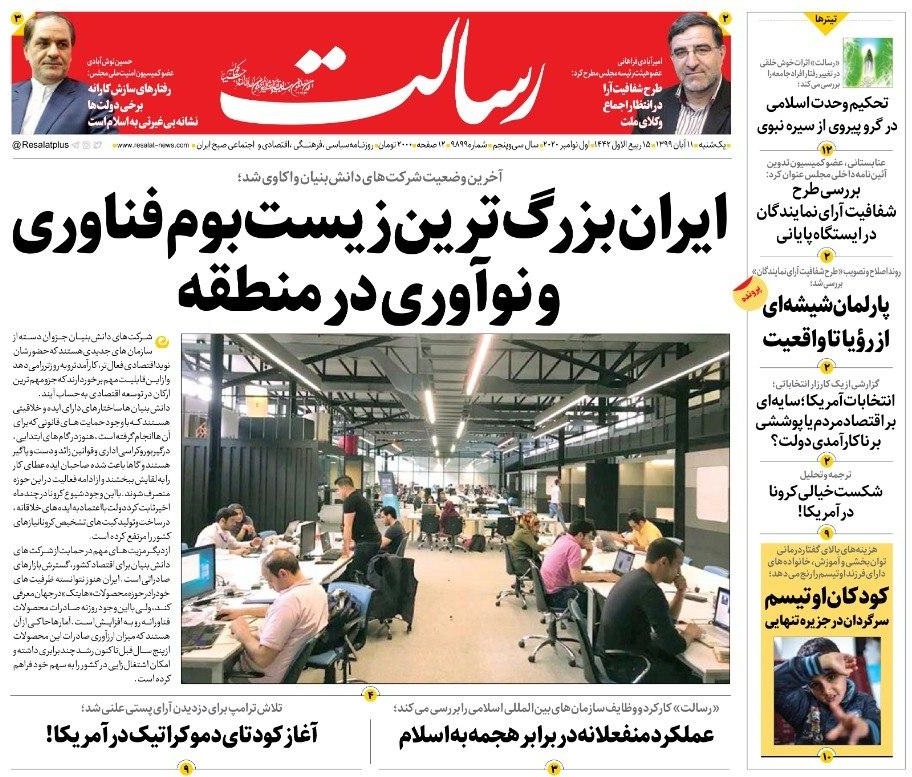Advisor to the Vice President for Science and Technology Affairs;
One billion dollars in exports of knowledge-based products; 300,000 jobs were created
Knowledge-based companies and soft and creative industries are among new organizations, the presence of which promises more active, more efficient and updated economy in the country. In addition, they are capable of being recognized as the most important pillars in economic development of the country.

Knowledge-based companies are structures with creativity and many ideas that are still dealing with administrative bureaucracy and excessive and cumbersome rules in the primary stages, which lead to the disappointment of idea owners and cancelation of their activities. However, the outbreak of the corona in recent months has proven that the government has met the country's needs in the manufacture and production of corona recognition kits by relying on creative ideas.
Another important benefit of supporting knowledge-based companies for the economy of the country is expanding export markets. Iran has still not being able to introduce its capacities in the “high-tech” field, but there has been an increase in the export of knowledge-based products. Statistics show that the exchange rate of exports of these products has multiplied since five years ago and has provided employment opportunities in the country for its share.
In the current situation, knowledge-based companies have shown their abilities and now is the time for government authorities and decision-makers to support knowledge-based companies beyond legitimating laws on paper so that those with ideas would not be disappointed in the end.

Parviz Karami, the secretary of the headquarters for knowledge-based economy and creative and soft industries and the advisor to the vice president for science and technology affairs, pointed out the activities of knowledge-based companies in an interview with “Resalat”, expressing: this was intangible to many academics during the years when the Supreme Leader introduced the discourse of the science production movement and the software movement. The country approved the law to support knowledge-based companies gradually in 2010, which was delayed to 2013, when about 10 knowledge-based companies were identified, assessed and qualified. Today, there are 5500 knowledge-based companies in the country.
Iran Has the Largest Innovation and Technology Ecosystem in West of Asia
Mentioning that Iran has the largest innovation and technology ecosystem in West of Asia, Karami added: this is not a slogan. We have many players in the innovation and technology ecosystem, including universities and science and technology parks, which formerly existed, and other players such as innovation centers, innovation parks, accelerators, VCs, startups and research centers. Iran is ranked 15th in the world in terms of science production, and this issue comes from the prestigious universities that exist in the country and are responsible for the main task of educating students.
Pointing out the lack of existence of startups in the past, Karami mentioned: missing circles in the past existed in this area and are now formed. Startups bring new ideas to young people within innovation and accelerator centers and turn them into products. There are now about 200 innovation centers within universities or private centers in various cities. Even though there were innovation centers and accelerators only in the IT field in the past two years, there are innovation centers in fields such as nano, bio, aerospace and stem cells today, providing technology-based products in the country.
Presence of Six Thousand Active Startups in the Country
He continued: today, there are six thousand startups in the country. Meanwhile, the term “startup” was unknown in the past. Our 5,500 knowledge-based companies had a turnover of about 120,000 billion tomans in the previous year and created 300,000 direct jobs. Industries affiliated with knowledge-based companies are being formed, and specialized forces are working with these companies.
The advisor to the vice president for science and technology affairs mentioned that innovation zones have been developed in the country, adding: if in the past, businesses such as grocery stores and service centers had grown near our universities, now knowledge-based and creative companies have sprung up alongside our universities in every city.
Pointing out the attraction of Iranian elites from other countries of the world, Karami mentioned: 1,500 elites from the world's top 100 universities entered the country or were recruited by academic faculties, working in research centers or starting their own startups. Out of 6,000 active startups in the country, 139 startups have been established and are operating in the country with the presence of elites returning to the country.
Explaining the formation of a new financing system by knowledge-based companies, Karami affirmed: in addition to the innovation and prosperity fund, which has three thousand billion Tomans of turnover for creating knowledge-based companies, credit lines have been established within banks, and VC companies have been established alongside research and technology funds. VCs are companies that have had risky investments of one thousand billion tomans and have injected them into the atmosphere of innovation and entrepreneurship.
The secretary of the headquarters for the knowledge-based economy and creative and soft industries reminded: annually, 10 thousand billion tomans are given to technology companies from banking resources. About 150 types of financial facilities and services, consulting, customs, legal and support are provided to knowledge-based companies by the scientific deputy and with agreements concluded with government and governmental organizations. About 150 types of financial facilities and services, consulting, customs, legal and support are provided to knowledge-based companies by the scientific deputy and with agreements concluded with government and governmental organizations.
Pointing out the leap of Iran’s global innovation rank, Karami asserted: in 2014, Iran was ranked 120th in the Global Innovation Index, but in 2019 it rose to 61st, and this statistic can be seen by referring to the Gii citation databases, which provide these reports every two years.
$1 Billion in Exports of Knowledge-based Products
Referring to the amount of exports through the products of knowledge-based companies, Karami said: every knowledge-based company, if it wants to sustain its goods, must enter the export fields. We export about $1 billion worth of knowledge-based products. However, exports of knowledge-based products have not yet been formed as they should be, as sanctions have prevented a surge in exports.
Karami continued: we have created 10 national pavilions in neighboring countries and have held 20 valid exhibitions so that commercial delegations could attend from other countries and see the high-tech Iranian products. These measures have increased our exports from $200 million over the past five years to $1 billion in exports of knowledge-based products.
The president of the information center of the Vice-Presidency explained: knowledge-based companies have taken proper steps toward export and if the issue of corona did not existed, the sanctions would not prevent export from Iran since the Iranian products equate the costly products of other countries.
Pointing out the entrance of knowledge-based companies in the field of sanctioned products, Karami mentioned: 98% of the medical equipment and drug needs of the country are met by these companies. Before corona, knowledge-based companies would not be taken of seriously. However, the prevalence of the disease increased the national confidence, which increased the knowledge-based capacities.
He continued: knowledge-based companies are testing and manufacturing the corona vaccine through six private companies. The flu vaccine is produced for the first time by a private sector knowledge-based company and has undergone all stages of testing and approval, and will be offered to the public by the end of November to the beginning of December.
He also mentioned: knowledge-based companies in the fields of environment, water, waste, mother food industry, seeds and seedlings, pesticides, mining, petrochemicals, advanced materials, home textile and textile industries, transportation, regulation, food security, drug production and machinery.
Regarding the parliament plan for production leap, which is put on the agenda of parliament members, Karami marked: this plan can improve our actions in the field of knowledge-based. Along with the growth and development of these companies, the activities of creative companies in the field of humanities and cultural industries and soft technologies are supported by the Vice-Presidency.
Pointing out the presence of startups of Iran in international exhibitions, Karami asserted: a national exhibition entitled “Made in Iran” has been held for four years ago, where knowledge-based products developed by Iranian companies are exhibited. In addition, universities and academic centers receive subsidy for purchasing products so that Iranian products are supported. In addition to selling products, the exhibition gives export incentives to knowledge-based companies to help them attend international exhibitions and half of the cost for attending the event is paid by the Vice-Presidency.
Regarding the proper conditions for the emergence of new and creative ideas in the country, Karami expressed: innovation factories have been established in nine metropolises. The factories are formed from private sector accelerators that are responsible for supporting the ideas of the youth. An idea is turned into a company after assessment and companies produce products.
He reminded: accelerators of innovation are the birthplace of startups and the formation of ideas and their optimal use. After the ideas are turned into a company by the Vice-Presidency and private sector accelerator companies, the investor is attracted and invests in the ideas.
Presence of Cumbersome Rules for Activities of Startups
Karami considered the presence of cumbersome rules to be a barrier to the activities of startups, adding: committees have been formed to deal with these rules. In the past, government organizations could easily prevent the activities of startups. However, a committee has been formed from the Vice-Presidency, the ministry of health and ministry of information to deal with complaints in the field.
The secretary of the headquarters for knowledge-based economy culture-building and creative and soft industries marked: of course, the utopia has not yet been formed for the activities of startups, and they are facing many difficulties in working, our safe haven is hopeful, and with the help of the parliament, disturbing laws are being refined.
He added: startups are created to get things done right. They bring innovation with them and innovation always imposes its influence. People join it because it facilitates and cheapens innovation.
Pointing out the difference in the sustainability of knowledge-based activities in startups, Sattari stated: knowledge-based companies start their activities through science and experience, and the government tries to give them maximum support. As a result, they are less likely to fail, but startups are more likely to fail.
The advisor to the vice president for science and technology affairs explained: everyone who enters the field of startup continues to work and stay in that field, but may change their idea and work. We try to make startups less problematic, but we have to accept that startup ideas are about 60 to 70 percent likely to fail.
A report by the public relations and information center of the Vice-Presidency for science and technology affairs
comment